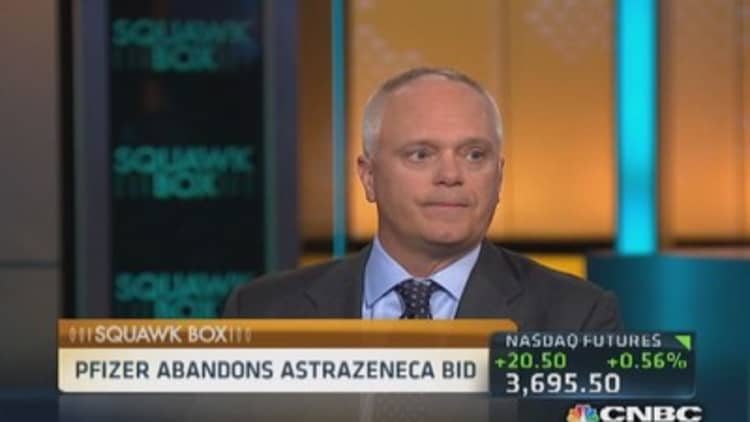Pfizer's almost $120 billion bid for AstraZeneca has been laid to rest, at least temporarily, after the time limit for a formal offer under U.K. takeover rules expired Monday without a deal.
So what's next?
Pfizer could, under the U.K. code, come back to AstraZeneca in six months, or in three months if AstraZeneca extends an invitation. During this time, AstraZeneca will be under pressure from investors to deliver on its promises that its pipeline can deliver the same value—or more—than Pfizer's bid offered. The first glimpse of whether that will be true may come this weekend at the American Society of Clinical Oncology, or ASCO, conference in Chicago, where cancer research results will be discussed.
Read MoreHow AstraZeneca escaped Pfizer's bid
It's also possible, notes ISI Group analyst Mark Schoenebaum, that Pfizer could make another bid between three and six months from Monday's deadline, as the U.K. takeover panel "almost always makes an exception" to the 6-month rule, he said in an email to clients Tuesday after a teleconference with the panel.
So Pfizer either waits out the U.K.-imposed stay on discussions and comes back again later this year, or it takes its considerable buying power elsewhere.
One analyst suggested New York-neighbor Bristol-Myers Squibb, with a market value of about $81 billion.
"The asset they need to look at, if they're interested in being No. 1 in oncology, is the potentially No.1 immuno-oncology business going forward, which is Bristol-Myers," said John Boris, an analyst with SunTrust, in a telephone interview Tuesday. "That's by far the most attractive property."
And while Bristol-Myers doesn't offer the same tax inversion possibilities as AstraZeneca, its tax rate in the high teens is lower than Pfizer's, so it could have a "favorable impact on the tax rate going forward," Boris said.
Read MoreTurning to 'gray market' to buy medicine
He suggested Pfizer take a look at Bristol-Myers in light of the asset swap earlier this year among Novartis, GlaxoSmithKline and Eli Lilly. Novartis bought Glaxo's cancer business for as much as $16 billion, while Glaxo bought Novartis' vaccines unit for up to $7.1 billion, and Eli Lilly bought Novartis' animal health business for $5.4 billion.

The companies made clear they wanted to get bigger in the areas where they could compete as a No. 1 or 2 player, and exit those where they couldn't, particularly as pressure on drug prices mounts.
Boris ranks AstraZeneca fourth in immuno-oncology, one of the hottest areas in drug development now that aims to harness the immune system to fight cancer. So, he argues, Bristol-Myers is a better play.
Alternatively, along the backdrop of Pfizer's potential split of its business into high-growth, innovative products and older, more stable drugs, Boris suggests it take a look at Actavis, with a market value of about $37 billion. An Irish-domiciled company, Actavis just bought Forest Labs for about $25 billion, bringing in a stable of both high-growth and older products Boris argues would strengthen Pfizer in both areas.
Read MoreWhy there's no end in sight for higher drug costs
Some suggest Pfizer think smaller, acquiring a few companies with market values of $3 billion to $10 billion.
"For $20 billion to $25 billion, they could have a pipeline, and if they chose right, they might find a tax-advantaged company in there as well," Les Funtleyder, author of "Healthcare Investing," wrote in an email. He also said, though, he doesn't think that's in the cards.
"What they most likely do is try to do a big deal because they really want to have cost cuts as a way to make short-term earnings to paper over pipeline deficiencies," Funtleyder said. "It's right there on the first page of Pfizer's playbook."
Pfizer, Bristol-Myers and Actavis all declined to comment.
—By CNBC's Meg Tirrell.


